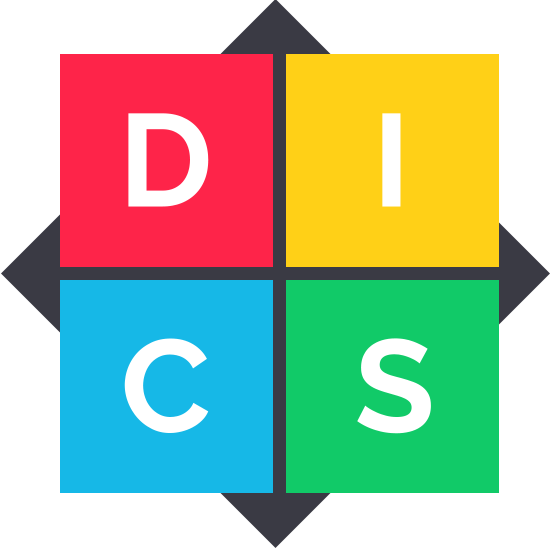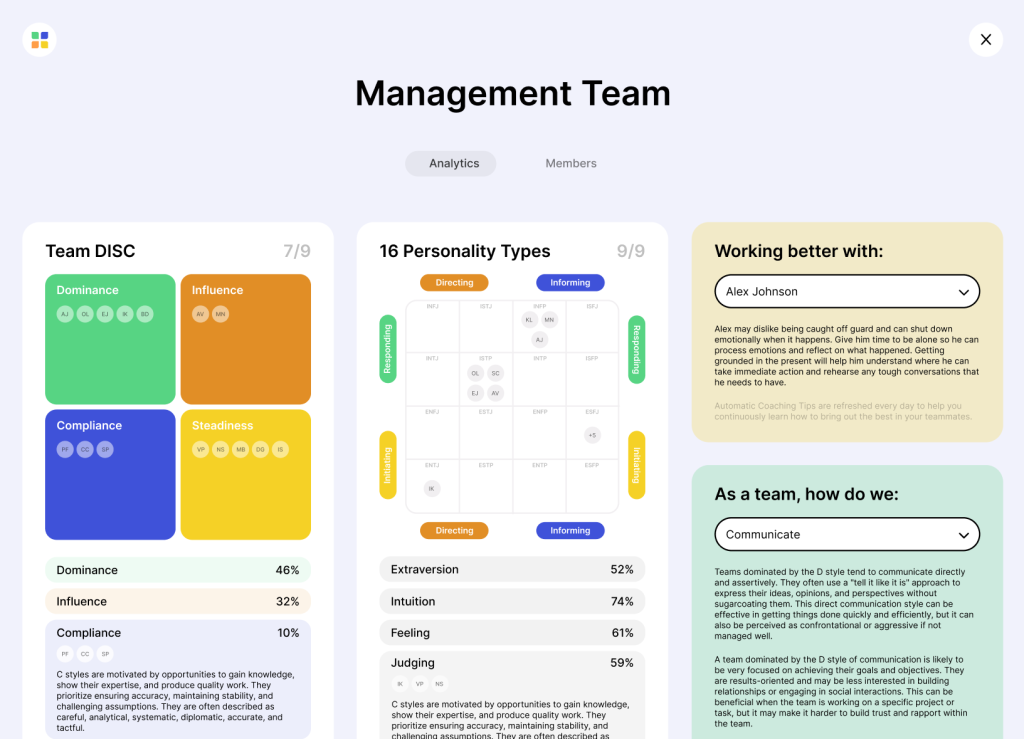Have you ever felt misunderstood or wished you could understand others better? The DISC test might be the solution.
The DiSC test is a popular, reliable personality assessment tool used by individuals and organizations to understand personal behavior and others’ behavior. It is widely employed to improve workplace teamwork, communication, and productivity.
This DISC test review will examine how the test is used, what it measures, and why it’s so essential today.

What is the DISC Personality Test?
The DISC personality test is a personality test that puts you in one of four behavior types which are Dominance, Influence, Steadiness and Conscientiousness.
The DISC Test finds its origins in the DISC theory by psychologist William Moulton Marston. In his groundbreaking 1928 book “Emotions of Normal People,” Marston posited that people exhibit one of four separate behavior types: Dominance, Influence, Steadiness, and Conscientiousness.
He believed these traits were neither inherently good nor bad but were different ways individuals expressed emotions and interacted with the world.
Marston was an accomplished psychologist and a contemporary of Carl Jung. His DISC theory, however, didn’t gain much traction until the 1970s when industrial psychologist Walter Clarke took the concept and developed the DISC assessment as a behavioral prediction tool. Today, the DISC test is widely used in business, education, and psychology to understand human behavior.
Dominance
The first trait, Dominance, is characterized by assertiveness, problem-solving, and risk-taking behaviors. People who score high in Dominance are often very active, task-oriented individuals. They prefer to lead rather than follow and enjoy challenges and new experiences.
Influence
People with high Influence scores are often outgoing, enthusiastic, and lively. They are social butterflies who thrive in team situations and are naturally persuasive. These individuals are great communicators and excellent at building relationships and inspiring others.
Steadiness
The third trait, Steadiness, is characteristic of patience, humility, and tactfulness. Those with high Steadiness scores are typically accommodating, reliable, and consistent. They’re good listeners team players, and highly value cooperation and peace.
Conscientiousness
Finally, Conscientiousness is found in people who are analytical, careful, and meticulous. They’re the ones who pay attention to the details and are often very accurate in their work. These individuals value organization and quality and are known for their high standards and systematic task approach.
How Do You Evaluate a DISC Personality Test?
Evaluating a DISC personality test involves understanding the four key traits the test measures: Dominance, Influence, Steadiness, and Conscientiousness. Each attribute corresponds to specific behaviors and attitudes; people’s scores in these categories can provide valuable insights into their personality and behavioral style.
When evaluating the Dominance aspect of the DISC test, you’re essentially gauging a person’s inclination towards assertiveness and leadership. High scorers in this category are typically go-getters, unafraid of taking the initiative and making decisions.
They are often comfortable in leadership roles, naturally gravitating towards positions where they can solve problems, take risks, and drive progress.
As for Influence, it’s all about social interactions and communication skills. If a person scores high on Influence, they are outgoing, persuasive, and thrive in team environments. They’re the ones who excel at building relationships, motivating others, and spreading enthusiasm.
Evaluating this trait involves assessing how well the person interacts with others, how they express themselves, and how effectively they can persuade or inspire those around them.
The Steadiness category focuses on a person’s patience, reliability, and team-oriented mindset. People with high scores in Steadiness are usually seen as rock-solid team support members.
They are good listeners, value cooperation, and are typically peacekeepers in group dynamics. Evaluate this trait by focusing on their listening skills, consistency, and how well they foster harmony within a team.
Conscientiousness, the final trait, is all about precision, quality, and organization. A high scorer in Conscientiousness is typically very careful, pays attention to details, and values a systematic approach to tasks.
They are likely to have high standards and be accurate in their work. Evaluate this trait by looking at a person’s attention to detail, work quality, and organization level.
Remember, it’s important to note that no one trait is better or worse than another in the DISC test. Each feature has its strengths and challenges. The goal of evaluating a DISC personality test is to understand a person’s behavioral style and how it may influence their interactions and performance in different settings.
What Do Employers Look for in a DiSC Assessment?
When employers use a DiSC assessment, they’re interested in understanding the unique behavioral style of each potential or current employee. This can help create a balanced, effective team and ensure an individual is well-matched to their role.

Employers may look at the four personality traits to understand how a candidate might work in different situations. For example, they may look for someone with high Dominance if they need a leader who can make decisions quickly and take initiative.
On the other hand, they may be looking for someone with high Steadiness if they need someone to act as a stabilizing force and support their team.
Overall, DiSC assessments can be a valuable tool for employers when creating an effective team of employees.
By understanding the unique behavioral style of each individual, they can make sure everyone is working in a role that best suits them and create a collaborative environment where everyone’s strengths are appreciated.
By understanding the DiSC personality assessment, employers can also better manage their employees. For instance, they may recognize stress behaviors and help employees constructively cope with them.
They can also provide individual coaching or team-building activities tailored to each individual’s behavioral style. This will create a strong team dynamic and ensure everyone works together towards the same goals.
Is the DISC Personality Test Accurate?
While the DISC assessment offers valuable insights into workplace behaviors, it’s important to note that it’s not a definitive measure of an individual’s personality. It’s a useful tool for understanding general behaviors and tendencies, but it can’t account for the complexities of human nature or situational factors that may influence behavior.
One of the strengths of the DISC assessment is its simplicity and clarity. It breaks down personality traits into four dominant behavioral styles, which makes it easy to understand and apply in the workplace.
It’s beneficial in team settings, where understanding these styles can help improve communication and collaboration. For instance, knowing that a team member has a high steadiness score can help other team members understand their systematic and supportive approach.
However, the DISC assessment does have its limitations. It provides a snapshot of a person’s behavioral style at a particular time but may not accurately represent their behavior in different contexts or over time. Additionally, the assessment is self-reported, which means responses can be influenced by the desire to present oneself in a certain way.
Context is crucial in interpreting and applying the results of the DISC assessment. A high dominance score, for example, might be advantageous in a leadership role but less effective in a supportive role.
Similarly, a high conscientiousness score can benefit functions that require precision and attention to detail, but it might hinder adaptability in fast-paced, rapidly changing environments.
Despite its limitations, the DISC assessment can still serve as an effective tool for enhancing self-awareness and improving team dynamics, as long as its results are interpreted with caution and context.
It is not a definitive measure of personality but a starting point for understanding and leveraging different behavioral styles within a team.
Is the DISC Test Scientifically Proven?
Let’s talk about the reliability and validity of the DISC test. These are two critical aspects to consider when evaluating any psychological test. Reliability refers to the consistency of the test results over time. In other words, would you get similar results if you were to take the test today and then again in a month?
Numerous studies have demonstrated that the DISC test is generally reliable, with consistent results.
Validity, on the other hand, refers to whether the test measures what it purports to measure. The DISC test claims to measure behavioral style, and many studies have supported this claim.
However, it’s important to note that while the test has been validated for its intended purpose, it does not measure personality traits, intelligence, or aptitude.
People’s behavior can change depending on the situation, so the DISC test results may not accurately reflect someone’s behavior in all contexts.
It captures a snapshot of a person’s behavior at a specific time and in a particular context, which means it should not be used to predict behavior in different scenarios or over extended periods.
Also, the results of the DISC test are self-reported, meaning the data collected relies on individuals accurately and honestly reporting their behavior. This can lead to skewed results, as people may subconsciously (or consciously) alter their responses to fit a preferred self-image. The limitation underscores the need to interpret and apply the effects carefully.
While the DISC test can be helpful, it isn’t a magic crystal ball. It’s best used as a broader approach to understanding behavior and improving team dynamics.
After all, people are complex, and our behavior can’t be neatly boxed into four categories. But as a starting point? The DISC can give us helpful insights into why we act as we do.
Why Take a DISC Personality Test?
The benefits of the DISC Test are many. Let’s review a few.
Professional Development
Understanding your DISC profile can be invaluable in a professional setting, particularly regarding team building and leadership. Knowing how each team member behaves can facilitate smoother communication, reduce conflict, and create a more cohesive team.
For example, if a leader knows they have a dominant style and a team member prefers a steadiness style, they might choose to communicate more patiently and calmly with that person.
This way, the leader can make sure they are not overwhelming their team member, and the individual feels more comfortable and heard.
Being aware of your DISC profile can also enhance your leadership abilities. It can help you identify your strengths and areas for improvement. For instance, if you are a high “D” (Dominance), you might excel in decision-making and problem-solving but struggle with patience or empathy.
Awareness of these tendencies can help you develop strategies to manage them effectively.
Personal Growth
On a personal level, taking a DISC test can significantly improve your self-awareness. The test can help you understand why you react the way you do in various situations and offer insights into your natural tendencies and motivators. This understanding can lead to more conscious decision-making and more effective communication.
For example, if you know you have a high “I” (Influence) style, you might realize you prefer talking and being the center of attention, but you might also tend to ignore details. Recognizing this can help you focus more on the details when needed.
Moreover, understanding your DISC profile can enhance your interpersonal skills. You can learn how to better interact with people of different styles, improving your relationships.
For instance, if you know your spouse or friend is a high “S” (Steadiness), you might need to slow down, be patient, and offer reassurance to communicate with them effectively. This understanding can lead to healthier, more harmonious relationships in and out of the workplace.
In the grand scheme of things, taking a DISC test provides an introspective view of one’s predominant behavioral styles, offering a lens through which individuals can comprehend their actions, reactions, and interactions.
Whether it’s improving team dynamics, enhancing leadership skills, or fostering personal growth, the benefits of a DISC test are manifold. It’s not a definitive guide to one’s personality, but it’s a tool that can help navigate the complex web of human behavior.
The Pros and Cons of the DISC Test
Let’s now consider the various DISC Test advantages and disadvantages.
Pros
The DISC test provides actionable insights that can be directly applied to improve team dynamics, enhance leadership skills, and foster personal growth. For instance, managers can use the test to understand their team members better and adapt their management style accordingly.
Individuals can use it to understand their strengths and weaknesses and work on personal development strategies.
Cons
The DISC test, however, is not without its drawbacks. One key disadvantage is the potential for oversimplification. The test categorizes people into four distinct behavioral styles, which can lead to stereotyping.
While the test does provide valuable insights, it’s important to remember that human behavior is complex and cannot be wholly distilled into four categories.
Another disadvantage is the lack of depth in the test results. While the DISC test provides an overview of an individual’s predominant behavioral styles, it doesn’t delve deep into the underlying psychological motivations or personal experiences that shape these behaviors.
While the DISC test can give a basic understanding of how a person might act, it doesn’t fully explain why they work that way.
How To Take the DISC Test
Taking the DISC test is a straightforward process, but there are a few factors to consider that may influence your results. Here’s a quick DISC test guide to help you get started.
Online vs. In-person
Online testing offers the convenience of flexibility. You can take the test at home, at your own pace, and in a comfortable environment. This eliminates the potential stress or anxiety associated with a formal testing situation, which can impact your results. However, the lack of professional supervision means there’s a risk of misunderstanding questions, which could skew your results.
On the other hand, taking the test in person under the supervision of a trained professional can ensure that you fully understand each question. This can lead to more accurate results, but the formal environment may make some people feel anxious and potentially affect their responses.
Tips for Accurate Results
Your mindset is critical to getting accurate results when taking the DISC test. It’s important to answer each question honestly rather than how you think you should respond. After all, the test is designed to uncover your natural behaviors, not your aspirational ones.
Avoid overthinking the questions. Your first instinct is often the most accurate, so don’t mull your responses too much—additionally, answer based on your typical behavior, not how you react in extreme or unusual situations.
Real User Feedbacks
After looking at various DISC Tests and user reviews, users have generally expressed positive sentiments regarding the DISC test, citing the accuracy and relevance of the results as critical advantages.
One user highlighted how the test pinpointed their personality traits and helped them understand their work style. This insight reportedly contributed to improving their professional relationships.
Another user praised the comprehensibility of the test, noting that it was easy to take and understand, leading them to recommend it to their peers.
DISC Test User Reviews: Positive Insights
Positive reviews also indicate that the test provides personal value beyond the professional sphere. Users stated that the DISC test improved their self-awareness and enhanced their relationships.
They better understood their behaviors, reactions, and motivations, which helped them communicate more effectively with their loved ones.
DISC Test User Reviews: Opportunity for Improvement
However, there were also some negative reviews. Some users found the results too generic, arguing that the test’s broad categories don’t account for nuanced personality traits. They felt that the test oversimplified their complex personalities, leading to potentially misleading interpretations.
Among the other criticisms, users mentioned that the test’s binary nature often forced them to choose between two extremes, which didn’t accurately represent their character. They expressed a need for more options instead of being confined within a limited range.
Some also mentioned that the test results could vary significantly based on their mood or circumstance at the time of taking the test, questioning its reliability.
Conclusion
Like any personality assessment tool, the DISC test has its strengths and limitations. According to user reviews, it provides valuable insights into one’s behavioral traits, promoting self-awareness and enhancing interpersonal communication.
However, its binary nature and generalization of complex personalities have drawn criticism. The validity of the results can also be affected by the user’s current state of mind. Therefore, while the DISC test offers a helpful starting point for self-understanding and personal development, it should be supplemented by other sources and methods to capture the full spectrum of a person’s character and behavior.
Disclaimer: BPT does not intend to replicate or to substitute the DISC test as both tests follow different methodologies, yet bring value in similar ways. Both tests help test takers be more aware of their own personalities. BPT does not dispute or diminish the value of the DISC test and encourages test takers to go through both assessments. If you have any questions, please do not hesitate to reach us.
DISC logo are trademarks of DISC Profile Corporation. All other trademarks not owned by BPT that appear on this website are the property of their respective owners, who may or may not be affiliated with BestPersonalityTests.


